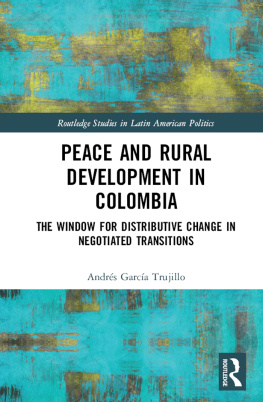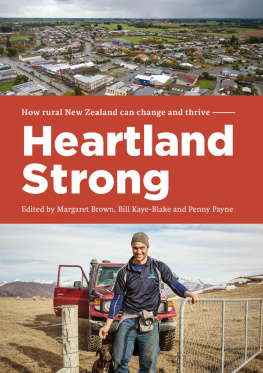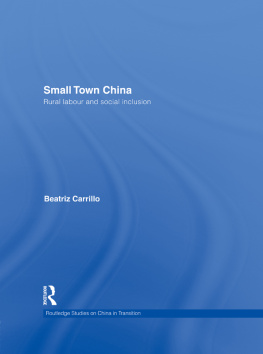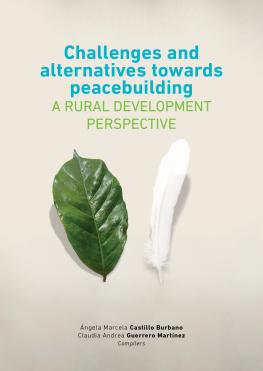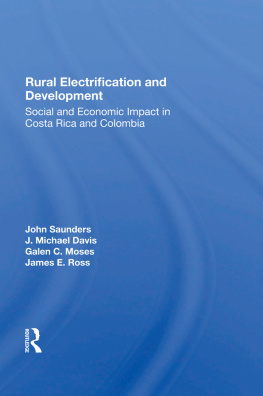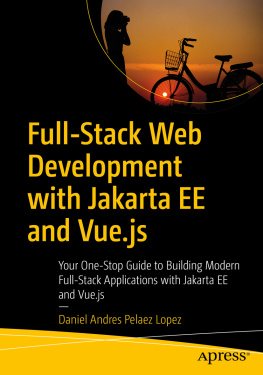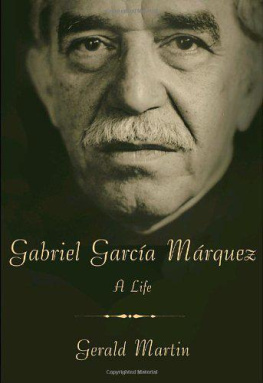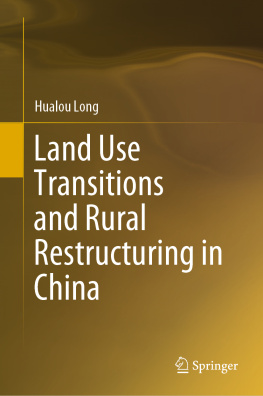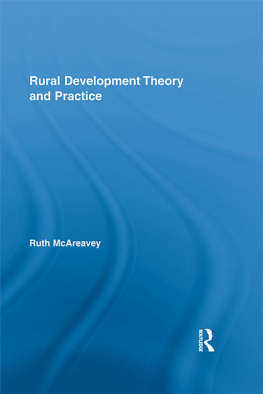Peace and Rural Development in Colombia presents a fascinating window into an incredible moment for potential social change: the peace accord that drew Colombias brutal half-century civil war to a close. Garca presents readers a front-row seat to the critical decisions behind rural development policy change and why peacebuilding has foundered. The resulting account is a must-read for students of conflict resolution, rural politics, bureaucracy, and post-war politics.
Michael Albertus, University of Chicago
Andrs Garca Trujillos brilliant, richly documented new book provides an insider account of the recent failed critical juncture for rural change in Colombia. In doing so, it offers a major new theory of the conditions under which pro-poor rural reform is possible. This book is essential reading for anyone interested in unlocking the puzzle of promoting land reform and rural empowerment in Latin America.
James Mahoney, Northwestern University
A successful peace process needs to do two very, very difficult, things: negotiate an end to the war and create the conditions for a lasting peace. The conceptual thread that ties the two is the idea of non-repetition, which we used to define the agenda of the negotiations with the FARC. The bedrock on which non-repetition and peace are founded, at least in the case of Colombia, is rural development. And the peace process in its turn opened an enormous window of opportunity for rural development: its a two-way street.
No-one is better qualified to explain why this is so than Andrs Garca, who as a key advisor in my team helped shape the negotiations in Havana, and subsequently as a doctoral student brought the relevant theoretical apparatus to bear on that vision and experience. The result is a lucid and compelling account of why the transformation of conditions in rural areas is part and parcel of any serious conception of peace in Colombiawe were in effect aiming to redefine the relation between state and society in the peripheral and violence-afflicted regions of the country, in what we called a territorial peace but also of the fierce political opposition of entrenched interests against any change to the status quo and therefore against peace. For anyone who cares about these issues, not just in Colombia, Peace and Rural Development in Colombia should be a standard work.
Sergio Jaramillo, former High Commissioner for Peace of Colombia
Peace and Rural Development in Colombia
In Peace and Rural Development in Colombia Andrs Garca Trujillo investigates whether peace agreements geared toward terminating internal armed conflicts trigger rural distributive changes.
Combining academic rigor with an insiders perspective, Garca Trujillo shows that the peace agreement in Colombia opened an exceptional window for addressing rural inequality. Yet, despite some progress, he argues that the agreements leverage to stir change was severely constrained by opposing actors within and outside the government. Garca Trujillo later applies the framework developed for the Colombian case to explain key dynamics of other post-conflict societies that have dealt with agrarian issues under a transitional context, like El Salvador or South Africa.
The original theoretical framework and empirically rich analysis make Peace and Rural Development in Colombia an indispensable read for scholars and practitioners who wish to gain an understanding on the political economy of peacemaking, policy change, and rural development in Colombia and beyond.
Andrs Garca Trujillo is an associate at the Institute for Integrated Transitions (IFIT) and a professor in the Economics Faculty of the Universidad Externado de Colombia. He served as adviser to the Colombian government in the peace talks with the FARC, mainly on rural development and implementation planning. He also worked at the Ministry of Agriculture in a program aimed at supporting family agriculture. He has over 14 years of academic and practitioner experience in development, conflict resolution, peacebuilding, and social policy. Andrs holds a BA in International Development Studies and International Political Economy from Trent University, an MA in Social Policy from Universidad Javeriana, and a PhD in Global Governance from the University of Waterloo, Canada.
Peace and Rural
Development in Colombia
The Window for Distributive
Change in Negotiated Transitions
Andrs Garca Trujillo
First published 2021
by Routledge
52 Vanderbilt Avenue, New York, NY 10017
and by Routledge
2 Park Square, Milton Park, Abingdon, Oxon, OX14 4RN
Routledge is an imprint of the Taylor & Francis Group, an informa business
2021 Taylor & Francis
The right of Andrs Garca Trujillo to be identified as author of this work has been asserted by him in accordance with sections 77 and 78 of the Copyright, Designs and Patents Act 1988.
All rights reserved. No part of this book may be reprinted or reproduced or utilized in any form or by any electronic, mechanical, or other means, now known or hereafter invented, including photocopying and recording, or in any information storage or retrieval system, without permission in writing from the publishers.
Trademark notice: Product or corporate names may be trademarks or registered trademarks, and are used only for identification and explanation without intent to infringe.
A catalogue record for this book is available from the British Library
Names: Garca Trujillo, Andrs, author.
Title: Peace and rural development in Colombia : the window for distributive change in negotiated transitions/ Andrs Garca Trujillo.
Description: New York, NY : Routledge, 2020. | Series: Routledge studies in Latin American politics | Includes bibliographical references and index.
| Identifiers: LCCN 2020015180 (print) | LCCN 2020015181 (ebook) | ISBN 9780367424084 (hardback) | ISBN 9780367823979 (ebook) | ISBN 9781000173772 (adobe pdf) | ISBN 9781000173802 (mobi) | ISBN 9781000173833 (epub)
Subjects: LCSH: Rural developmentColombia. | PeaceEconomic aspectsColombia.
Classification: LCC HN310.Z9 C6335 2020 (print) | LCC HN310.Z9 (ebook) | DDC 307.1/41209861dc23
LC record available at https://lccn.loc.gov/2020015180
LC ebook record available at https://lccn.loc.gov/2020015181
ISBN: 978-0-367-42408-4 (hbk)
ISBN: 978-0-367-82397-9 (ebk)
by MPS Limited, Dehradun
To LilianaContents
This book derives from my personal experience as a government advisor on the Colombian peace talks between 2012 and 2017 and from research carried out for my doctoral dissertation. It therefore brings together the insights of practice with those of scholarly work. I decided to embark on this project to explore the unsettling questions I had (and still have) on whether the transition from war to peace Colombia is experiencing could serve to address the countrys stark rural inequalities. During the time I was in government, I was aware of the privileged vantage point my position offered to reflect on the opportunities and limitations of advancing a rural distributive agenda amid the peace talks. I set out to understand how state dynamics operate under these exceptional circumstances and the consequences for the trajectory of rural policy in the country.
Due to my work in government, the story I ended up telling is more about decisions in hallways and offices in Bogot than one about on-the-ground regional dynamics and rural inhabitants, where communities create and develop their own destinies. It is my hope that this analysis contributes to a better understanding of rural reform politics amid peace processes and that it may be enriched by others working on and living in rural Colombia and elsewhere in the developing world.

